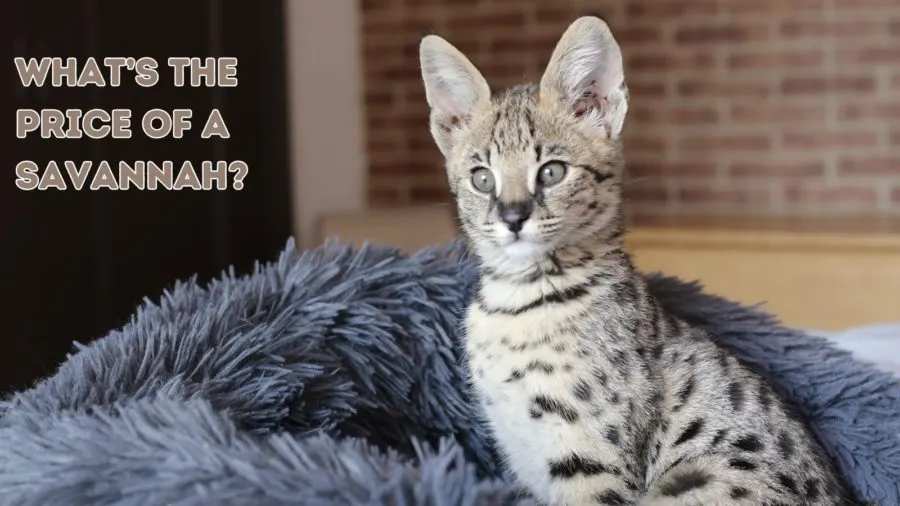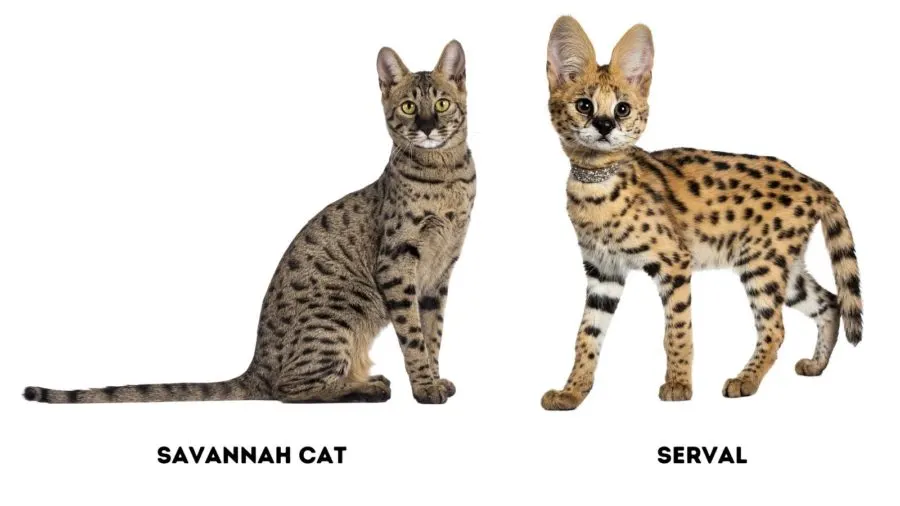Savannah cats, with their striking appearance and dynamic personalities, are known for their leopard-like spots, long legs, and sociable nature–and major price tag. The cost of owning a Savannah cat, however, goes beyond initial adoption. The Savannah cat price is more complicated than for most cat breeds with some factors that might surprise you.

What is a Savannah?
Savannah cats are a hybrid breed, created by crossing a domestic cat with an African Serval. This unique lineage contributes to their distinct physical characteristics and behaviors.
They are known for their large, erect ears, long bodies, and spotted coats, resembling a small cheetah or leopard.

The different generations of Savannah cats, referred to as F1, F2, F3, and so on, indicate how closely related the cat is to its Serval ancestor.
An F1 Savannah cat, for instance, has a Serval parent and a domestic cat parent, making it 50% Serval. As the generations progress, the percentage of Serval decreases. These generational differences not only affect their physical and behavioral traits but also play a significant role in their pricing.
Factors Influencing Price
The price of a Savannah cat can vary greatly depending on several key factors:
Generational Differences
F1 Savannahs, being the closest to their wild ancestors, are typically the most expensive. Their rarity and more pronounced exotic features drive up their value.
F2 and F3 generations are less costly but still command a high price due to their significant Serval lineage. The price tends to decrease with each subsequent generation.
Breeding Standards
The reputation and standards of the breeder play a crucial role in pricing. Reputable breeders invest significantly in the health and well-being of their cats, including genetic testing, proper nutrition, veterinary care, and socialization. This investment is often reflected in the price. Ethical breeders work to meet the breed standards.
Savannah cats, like any breed, are susceptible to certain genetic health conditions. Genetic testing allows breeders and owners to identify these conditions early on. This proactive approach is vital in managing or even preventing the development of diseases like hypertrophic cardiomyopathy (HCM), which is a common heart condition in cats, including some Savannahs.
To maintain a healthy breeding population and avoid the pitfalls of inbreeding, genetic testing can be used to ensure genetic diversity. This is particularly important for Savannah cats due to their limited gene pool, especially in the higher generations like F1 and F2.
Genetic testing provides a definitive way to confirm a Savannah cat’s lineage. This is important for both breeders and buyers, as it verifies the cat’s generational status (e.g., F1, F2, etc.) and ensures the authenticity of the breed, which directly influences its value and price.
Health and Vaccinations
A healthy kitten with a complete set of vaccinations and genetic health testing will generally be more expensive. These health assurances are critical for the long-term well-being of the cat and can prevent costly medical issues in the future.
Appearance
Specific traits like coat color, pattern, size, and ear shape can influence the price. Cats that closely resemble the Serval in appearance often command higher prices.
Average Price Range of a Savannah Cat
The cost of a Savannah cat varies widely based on the factors mentioned above. By generation, here’s a look at the average price:
- F1 Savannah Cats: $10,000 – $20,000+
- F2 Savannah Cats: $6,000 – $10,000
- F3 Savannah Cats: $2,000 – $5,000
- F4 and beyond: $1,500 – $4,000
These prices can fluctuate based on the breeder’s location, the cat’s individual characteristics, and market demand. It’s important to note that these figures are just averages, and prices can be higher or lower.
Additional Costs to Consider
Beyond the initial purchase price, prospective Savannah cat owners should budget for additional costs. These include:
Initial Setup: This includes costs for a carrier, litter box, toys, bedding, and other essentials. Specialized diets and larger enclosures may also be necessary, especially for higher generation Savannahs. These are not cats that are going to be happy or successful just hanging around the house. Large enclosures like oversized catios can give Savannahs room to explore.
Ongoing Expenses: Routine expenses such as food, litter, grooming supplies, and veterinary care, including vaccinations and regular health check-ups, are to be considered. Savannah cats, with their high energy levels and intelligence, may also require more interactive toys and activities.
Potential Health Issues: As with any breed, Savannah cats may have specific health issues. It’s essential to research and prepare for any potential hereditary health problems.
Legal and Ethical Considerations
Before you seriously consider one of these cats, know that the legality of owning a Savannah cat can vary by location. Some regions have restrictions or require special permits, especially for the higher generations closer to their wild ancestors.
The legality of owning Savannah cats varies significantly across the United States, with certain states imposing restrictions or outright bans on their ownership.
The regulation often depends on the specific generation of the Savannah cat, with earlier generations (F1, F2, F3) being more closely related to their wild African Serval ancestors and thus subject to stricter laws.
In several states, Savannah cats are completely illegal, regardless of their generational classification including:
- Georgia: The law in Georgia prohibits the ownership of most exotic cats, including all filial generations of Savannah cats.
- Hawaii: Under Plant Quarantine (PQ) law, all generations of Savannah cats are considered hybrids and are thus banned.
- Nebraska: The state prohibits the ownership of all hybrid cats, including Savannahs.
- Rhode Island: Here, owning a hybrid cat such as a Savannah is illegal, and it’s extremely difficult for the average person to meet the requirements for a permit.
Other states have restrictions based on the generational classification of Savannah cats. For example:
- Alaska, Iowa, Massachusetts, New Hampshire, and Vermont allow F4 and later generations of Savannah cats.
- New York State allows F5 and later generations, but New York City bans all Savannah cats.
- Texas generally prohibits Savannah cats but allows them with strict permitting in specific counties.
It’s crucial for potential owners to check local regulations and obtain any necessary permits before acquiring a Savannah cat.
Ethical considerations also come into play. It’s important to source these cats from reputable breeders who prioritize the welfare of their animals and are committed to ethical breeding practices. This ensures the long-term health and well-being of the breed and supports responsible pet ownership.
Owning a Savannah cat can be a deeply rewarding experience, offering companionship with a touch of the wild. However, it comes with a set of responsibilities, both financial and ethical. Prospective owners must consider the initial and ongoing costs, legalities, and ethical implications of owning such an exotic pet.
Adopting a Savannah at a Rescue
You might be surprised to learn that the Savannah can also be found at rescues on occasion. The Savannah Cat Rescue uses a foster home system to care for Savannahs looking for a forever home. Many of these are cats that have been returned to breeders when owners find that the Savannah presented more of a challenge than their lifestyle could accommodate.
More Articles You Might Like
What is the Price of a Persian Cat? {Breeders, Rescues & Shelters}
Cat DNA Day: What Could Your Cat’s DNA Tell You?
280 African Cat Names Rooted in the Wild and Wonderful
- 🎉 GIVEAWAY: Lord of the Pets Portrait of Your Cat! - November 26, 2024
- Review: Lord of the Pets Cat Portraits! - November 26, 2024
- Cat Adoption: FAQ You Might Have - June 28, 2024
